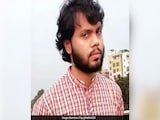Balendra Shah, a rapper-politician with a degree from an Indian university, and parliamentarian Sumana Shrestha, an economist with an MBA from the Massachusetts Institute of Technology are among rumoured frontrunners to succeed KP Sharma Oli as Prime Minister of Nepal.
Judging by the outpouring of Gen Z support for Mr Shah on social media, the Mayor of Kathmandu is seen as an acceptable replacement, particularly after a measured appeal for peace and calm on Facebook was met with calls for 'Balen dai (elder brother)' to take the helm.
"Dear Gen Z (protesters), your demand for the resignation of the government has been met."
READ | Engineer, Rapper, Mayor, PM? Nepal's Gen Z Rallies Around Balen Shah
"Now it is time to remain restrained," he wrote on the once-banned social media platform. On the protesters he wrote, "...I want to understand their aspirations, objectives and thinking."
Amid the upheaval, rapper-politician Balen Shah voiced solidarity with demonstrators.
However, there is support also for Ms Shreshta who, if chosen, will bring with her experience as the country's former Science, Education, and Technology Minister.
The 40-year-old - who also has degrees from Bryn Mawr College and Haverford College in the US - made headlines after introducing herself in Parliament as a 'management consultant' and calling for gender equality.
And Rabi Lamichhane - a former Guinness World Record-holding journalist, who served briefly as Deputy Prime Minister and was roiled in a citizenship row - is believed to be the dark horse.
Mr Lamichhane is perhaps the most experienced option.
The 49-year-old was twice Nepal's Deputy Prime Minister and twice its Home Minister.
But the Chairperson of the Rastriya Swatantra Party - of which Ms Shrestha is a member - is possibly the least acceptable option, given he was arrested and jailed in April in connection with a cooperative savings case. A video from the prison today showed him outside his cell.
It is not clear, though, if the protesters actually forced his release from jail.
There are other names doing the rounds too, including former Prime Minister Sher Bahadur Deuba. But Mr Deuba's candidature is even less likely than Mr Lamichhane after visuals emerged of the former PM, and members of his family, being assaulted by some protesters.
Why does Nepal need a new Prime Minister?
Because Mr Oli, 73, was forced to resign Tuesday afternoon following violence that began 36 hours earlier, ostensibly over a ban on social media websites. Faced with the explosion of anger, the government withdrew its order but the Gen Z protests continued unabated.
READ | Nepal PM Oli Resigns Amid Deadly Gen Z Protests, Chaos On Streets
It soon became apparent the reality was otherwise; nearly 21 per cent of Nepal is between 16 and 25 years old - i.e., in the Gen Z category - and these protests have called out the KP Sharma Oli-led governnment over widespread corruption and the lack of economic growth in the nation.
Protests that began with Gen Z men and women taking to Kathmandu streets and clashing with police - tear gas and water cannons were fired in failed bids to restore control - rapidly spun into pitched battles, and protesters barging into and setting government builidings on fire.
VIDEO | Nepal Finance Minister Chased Through Street, Kicked, Thrashed
Mr Oli's resignation was supposed to quell the protests and the violence, but that does not seem to be the case. Two more deaths were reported Tuesday to add to the 19 from Monday.
The unrest is the worst in decades as Nepal - wedged between India and China - struggles with political instability and economic uncertainty that led to the abolition of its monarchy in 2008.
READ | Ex Nepal PM's Wife Burnt Alive As Protesters Set His House On Fire
Mr Oli resigning - a key demand of the protesters - has been seen as the first step to the government being dismantled. In Nepal, however, the resignation of the PM does not mean that. The PM is the head of the executive. It is the President who is the head of the government.
And shortly after Mr Oli stood down, the President, Ram Chandra Paudel, also quit.
What's next for Nepal is unclear.
Theoretically the ruling alliance - the Oli-led CPN-UML, the Nepali Congress, and the Maoist Centre - still have the numbers. But the latter two have reportedly threatened to walk out too.
That would put the CPN-UML in the minority and the government will likely fall. And that could leave the door open for a new and younger Prime Minister - Balen Shah, Sumana Shrestha, or someone else entirely - to take Nepal forward.
NDTV is now available on WhatsApp channels. Click on the link to get all the latest updates from NDTV on your chat.















